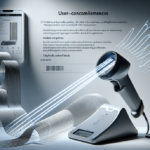Importance of Bar Code Scanning in Ecommerce Shipping
Bar code scanning is an indispensable tool for ecommerce businesses aiming to maintain accurate inventory levels and ensure efficient order fulfillment. According to a Statista report, efficient inventory management systems can reduce operational costs by up to 20%. By utilizing bar code scanners, businesses can quickly update inventory levels in real-time, process orders more swiftly, and enhance overall operational efficiency. This not only leads to increased customer satisfaction but also fosters repeat business by minimizing errors and delays.
Furthermore, bar code scanning aids in reducing shipping costs. Accurate tracking of inventory and order information allows businesses to optimize their shipping processes, potentially decreasing the number of shipments required and lowering overall expenses. Additionally, addressing shipping errors promptly—such as incorrect addresses or missing items—helps prevent costly returns and dissatisfied customers.
Types of Bar Code Scanners
Handheld Bar Code Scanners
Handheld scanners are the most prevalent type, offering both wired and wireless connectivity options. They are highly versatile, suitable for various settings, and easy to deploy in different parts of a warehouse or shipping facility. However, for businesses with high-volume scanning needs or expansive warehouse spaces, handheld scanners might not be the most efficient choice.
Fixed-Mount Scanners
Fixed-mount scanners are installed in a stationary position, allowing them to scan bar codes from a distance. They are ideal for environments requiring high-volume scanning, such as large warehouses or conveyor systems. While they offer enhanced efficiency, fixed-mount scanners are typically more expensive and may require regular maintenance.
Mobile Bar Code Scanners
Designed for use with mobile devices, these scanners are compact and portable, making them suitable for on-the-go scanning tasks. Although they offer flexibility, mobile scanners may have limitations in scanning capabilities and battery life compared to their handheld and fixed-mount counterparts.
Selecting the Right Bar Code Scanner
Assessing Your Business Needs
Determining the appropriate bar code scanner involves evaluating your business's specific requirements. Factors to consider include the volume of scanning, the layout of your shipping facility, preferred connectivity (wired vs. wireless), and budget constraints. For instance, a large warehouse with high scanning demands may benefit more from fixed-mount scanners, whereas a smaller operation might find handheld or mobile scanners more suitable.
Essential Features to Consider
When selecting a scanner, prioritize features that enhance efficiency and accuracy. Look for models with fast scan speeds and high accuracy rates to ensure swift and precise inventory tracking. Durability is also crucial, especially in busy shipping environments where scanners are subjected to constant use.
- Barcode Compatibility: Ensure the scanner can read various barcode types, including 1D and 2D codes.
- Connectivity: Decide between wired and wireless options based on your operational needs.
- Ergonomics: Choose scanners that are comfortable to handle, especially if they will be used extensively throughout the day.
Connectivity Options: Wired vs. Wireless
The choice between wired and wireless scanners hinges on your business's mobility and reliability needs. Wired scanners generally offer more stable connections and are cost-effective, making them suitable for stationary setups. Conversely, wireless scanners provide greater flexibility and mobility, which is advantageous in dynamic environments where staff need to move freely. However, wireless scanners may face connectivity issues in environments with high interference.
For businesses requiring high mobility, investing in wireless scanners may result in improved productivity despite the higher initial cost.
Choosing a Reputable Manufacturer
Selecting a trustworthy manufacturer is vital to ensure the longevity and reliability of your barcode scanners. Renowned brands like Honeywell, Zebra Technologies, and Motorola Solutions are recognized for their high-quality products and robust customer support. When evaluating manufacturers, consider the following:
- Product Range: A diverse product lineup indicates the manufacturer's ability to meet varying business needs.
- Customer Support: Reliable support and service options are essential for addressing any technical issues promptly.
- Warranty and Maintenance: Comprehensive warranty policies and maintenance services can extend the lifespan of your scanners.
Cost-Efficiency Strategies
Investing in high-quality barcode scanners can yield significant long-term savings by reducing errors and streamlining operations. To manage upfront costs, consider the following strategies:
- Look for Deals and Discounts: Keep an eye out for promotions from retailers or manufacturers, especially during peak shopping seasons.
- Consider Refurbished Models: Certified refurbished scanners can offer substantial savings while maintaining reliability.
- Bulk Purchases: Buying scanners in bulk can often unlock discounts, making it more economical for larger operations.
- Bundle with Other Tools: Packaging your scanner purchase with other inventory management tools can lead to additional savings.
Maintenance and Troubleshooting
Maintaining Your Barcode Scanner
Proper maintenance is crucial for ensuring the optimal performance and longevity of your barcode scanners. Regularly clean the scanner lenses to prevent dust and debris buildup, which can impede scanning accuracy. Additionally, routinely calibrate your scanners to maintain precision and update their firmware to benefit from the latest features and security enhancements.
Investing in protective cases or covers can also safeguard your scanners from physical damage, especially in demanding shipping environments.
Troubleshooting Common Issues
Despite their reliability, barcode scanners can encounter issues. Common problems include connectivity disruptions, scanning inaccuracies, and hardware malfunctions. To address these:
- Connectivity Issues: Ensure that wireless scanners are adequately charged and within range of the receiver. For wired scanners, check cable connections for any signs of wear or damage.
- Scanning Inaccuracies: Clean the scanner lenses and ensure that barcodes are not damaged or obscured.
- Hardware Malfunctions: Refer to the user manual for specific troubleshooting steps or contact the manufacturer’s customer support for assistance.
Future Trends and Staff Training
The Future of Barcode Scanning in Ecommerce Shipping
The barcode scanning landscape is continuously evolving with advancements in technology. Future trends indicate a greater integration of artificial intelligence (AI) and machine learning to enhance scanning accuracy and predictive analytics. Innovations such as augmented reality (AR) can further streamline the shipping process by providing real-time data overlays for warehouse operations.
Moreover, increased connectivity through the Internet of Things (IoT) will enable more seamless integration of barcode scanners with other automated systems, enhancing overall efficiency and data management.
Training Your Staff for Optimal Use
To maximize the benefits of your barcode scanning investment, comprehensive staff training is essential. Training should cover:
- Proper Scanner Handling: Educate staff on the correct way to handle and operate scanners to minimize wear and prevent errors.
- Troubleshooting Basics: Provide basic troubleshooting skills to empower staff to resolve minor issues independently.
- Maintenance Procedures: Instruct on routine maintenance tasks such as cleaning and calibrating scanners to sustain performance.
Ongoing training and support ensure that your team remains proficient in using barcode scanners, thereby maintaining high levels of efficiency and accuracy in your shipping operations.
Conclusion
Selecting the best barcode scanner for your ecommerce shipping needs involves a thorough evaluation of your business requirements, understanding the different types of scanners available, and choosing reputable manufacturers. By considering key features, connectivity options, and cost-efficiency strategies, you can make an informed decision that enhances your operational efficiency and accuracy. Additionally, maintaining your scanners and training your staff effectively will ensure that you fully leverage the benefits of barcode scanning technology, positioning your ecommerce business for sustained growth and success.


















